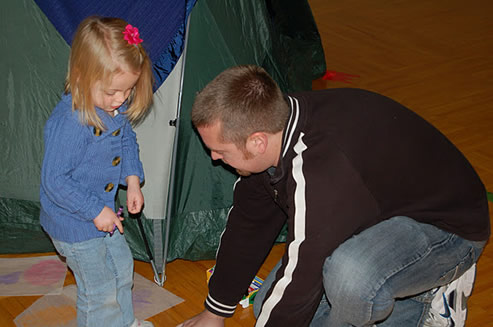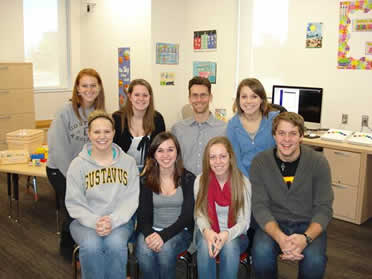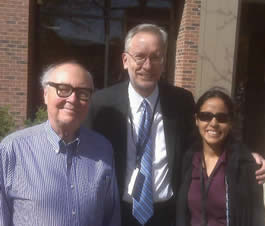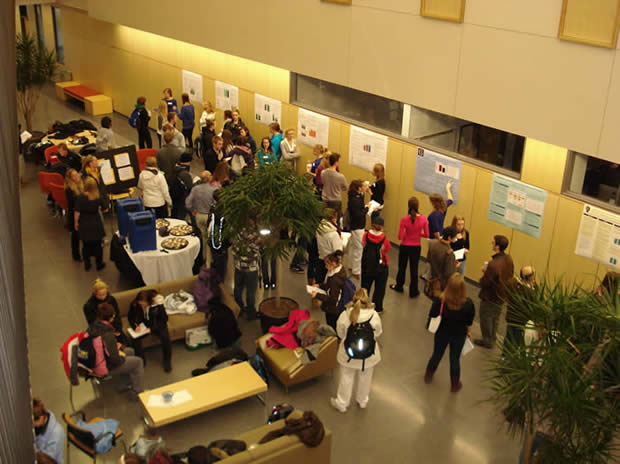Emil's Epilogue -
December 2011

Fall Festival 2011...
Psy 234 Developmental Psychology students shared their
exhibits with families at the St. Peter Community Center on November 10, 2011 (click here for amazing additional photos)
My name is Kelsey Marcks and I was the Student Project Coordinator for
the PSY-234 Fall Festival. I was first introduced to this project in
the fall of 2010 when I was a student in the class and had to create,
within a group, our  own exhibit. I then had the opportunity to intern
with the Children's Museum of Southern Minnesota in the spring of 2011
which opened the door for me to help with coordinating the project this
fall.
own exhibit. I then had the opportunity to intern
with the Children's Museum of Southern Minnesota in the spring of 2011
which opened the door for me to help with coordinating the project this
fall.
Being a senior, I've had the chance to participate in a variety of
projects and can honestly say this one was the most unique and fun to be
a part of, from both the student and coordinator side. As a
coordinator, I was involved in a lot of planning and organization. My
tasks included communicating with the Children's Museum of Southern
Minnesota and St. Peter Community Center, answering any questions
students had or finding them equipment for their exhibit, creating an
event layout for all of the exhibits, advertising the festival
throughout the Gustavus and St. Peter community, helping with set-up and
take-down on the day of the festival, and compiling results of parent
surveys collected at the festival. I was very happy to be a part of this
project for a second time, it is a great way for Gustavus to connect
with the community and has personally opened other doors for me and
introduced me to careers at a children's museum that I would have never
thought of.
Psychology Student Research Symposium - Fall 2011... Symposium Poster Fall 2011
The new Beck Hall atrium provided an excellent forum for Psychology students presenting research on Friday, December 9. (Click here for more photos)
Center for Developmental Science Prepares to Open at Gustavus...
 Students have been working hard this semester to get the new Center for Developmental Science ready to conduct research with children in the St. Peter and Greater Mankato area. A website with a lab video tour, descriptions of studies, and recruitment information will be launched early next year, and informational brochures will be circulated to area schools next semester. In the meantime, students have started to design studies for the children to participate in and are continuing data collection on adult versions of similar experiments. If you are interested in being a research assistant in the center, please visit contact Kyle Chambers (kchamber@gustavus.edu).
Students have been working hard this semester to get the new Center for Developmental Science ready to conduct research with children in the St. Peter and Greater Mankato area. A website with a lab video tour, descriptions of studies, and recruitment information will be launched early next year, and informational brochures will be circulated to area schools next semester. In the meantime, students have started to design studies for the children to participate in and are continuing data collection on adult versions of similar experiments. If you are interested in being a research assistant in the center, please visit contact Kyle Chambers (kchamber@gustavus.edu).
Front Row (Left to Right): Katelyn Warburton, Madison Heckel, Caroline Hendrickson, Luke Youngvorst.
Back Row (Left to Right): Caitlin Bayer, Suzanna Massaro, Kyle Chambers, Laura Kientzle
Summer research opportunity - University of Maryland - College of Behavioral and Social Sciences - (BSOS Summer Research Initiative)
Faculty Publications - Dr. Lauren Hecht
Dr. Lauren Hecht recently had an article "Delayed offset detection on figures relative to backgrounds" published in the Journal of Vision, Volume 11, Number 13, 2011
Alumni Update - Anaya Mitra '03
Greetings Gustie Psych Majors!
Let me take you on a not-so-brief journey of my academic travels that took me from Minnesota to Florida and back; and how I came to be a faculty member in a Psychology department, in a small-ish liberal arts college, in a big-ish city.
My name is Anaya Mitra and I graduated in 2003. I was a Psychology-Biology double major (the interdisciplinary neuroscience/psychology program was just coming online around the time I was finishing up), and after taking Tim's “Brain and Behavior” class, and Mike's Neuroscience class, I decided that biological psychology/behavioral neuroscience (it goes by many names) was the field for me. I applied to graduate school in my penultimate semester…a harrowing process, but well worth it. I matriculated into the University of Florida's Behavioral Neuroscience program.
My mentor's research areas were broad and he was very flexible in accommodating my research interests. This is more important than it seems at first. If you are truly interested in “it all” (which very few truly are), then any mentor will likely work for you (provided you don't have personality clashes ), but if you have a specific interest, it is better to find a mentor/lab/program that fits your interests, rather than joining one simply based on prestige, or worse, convenience. Graduate school was a research heavy experience for me, which I thoroughly enjoyed. I took classes in my first two years, after which most of my graduate work involved the completion of my doctoral research.
I had my first real taste of animal research in graduate school, and for the first week, I thought I might have made a mistake…picking up a 600 gram rat, that was looking at me resentfully (or so I anthropomorphized), was an anxiety-inducing event, like none other. However with practice and the patient guidance of my laboratory technician, I eventually became very comfortable handling my furry, albino research subjects. While I was getting my PhD, I also earned a Master's degree in public health, which allowed me to view my obesity-related research more broadly. I encourage you all to look into Public Health; it is a growing field and there is a growing need in this country for primary health care initiatives, which tend to be more cost-effective than tertiary health care options.
After graduate school, I returned to the land of snow and ice (that is MN) and started my postdoctoral research at the University of Minnesota and the VA medical center. During the course of my postdoctoral work, I realized that while I loved academia, research and answering interesting questions, I was less excited about grant writing (which is how we get our funds to pay salaries, buy rats, buy equipment and so forth), and grant money was quicklybecoming something of a mythical entity. So I started considering alternatives to academic research; industrial research, or teaching. The former option had the advantage of allowing me to continue to do research, without worrying about funding; however I would not have any control over my research. The latter option allowed me to remain in the world of academia (a splendid place to be), without the burden of grant writing; however my researchprospects would be limited. It was (or so I thought) a difficult choice.
It turns out, that the choice was not that difficult after all. St. Catherine University‟s psychology department was looking for someone with my research interests. I applied for the job, and as luck would have it, I was called for an interview. I went in well prepared for the interview, but, was not “REALLY REALLY” wanting the job at that point…I was simply "considering alternatives‟. But then I met the department, and met the people, who would end up being my future colleagues, and it suddenly became very clear to me, that this was the job I REALLY REALLY wanted, and again, as luck would have it, I got the job! I am now in my first semester here at St. Kate's and despite the 
Tim Robinson '65, Tom Bergquist '83 and Anaya Mitra '03 at Nobel Conference 2011.
Click here for previous Alumni Updates
MUPC at Gustavus this spring!
April 28, 2012 - Minnesota Psychology Undergraduate Conference - hosted by GUSTAVUS! The keynote speaker will be Dr. Laurie Santos. Dr. Santos is an Associate Professor in the Department of Psychology at Yale University (Ph.D. 2003, Harvard University).
Why is this newsletter named Emil's Epilogue? Who is Carl Emil Seashore?
 In the entry lobby of the psychology
department there is a bust of Carl Emil Seashore, an 1891 graduate of
Gustavus. Widely recognized as one of the early leaders in psychology in
America, Dr. Seashore spent most of his professional life at the
University of Iowa. He was a member of the faculty at Iowa from 1897
until his retirement in 1937. In addition to his duties as professor and
chairman of his department, he was made Dean of the Graduate School,
University of Iowa, in 1908 and held that position concurrently with his
other duties for 28 years. He retired in 1937 at the age of seventy but
was recalled as Dean Pro Tempore of the Graduate School in 1942 and
finally retired for the second time in 1946 at the age of 80. Most
people who recognize his name today associate it with the Seashore Tests
of Musical Ability which are still widely used. He was a man of wide
ranging abilities and achievements and certainly one of the outstanding
alumni of Gustavus. Click here for additional biographical information on Carl Emil Seashore..
In the entry lobby of the psychology
department there is a bust of Carl Emil Seashore, an 1891 graduate of
Gustavus. Widely recognized as one of the early leaders in psychology in
America, Dr. Seashore spent most of his professional life at the
University of Iowa. He was a member of the faculty at Iowa from 1897
until his retirement in 1937. In addition to his duties as professor and
chairman of his department, he was made Dean of the Graduate School,
University of Iowa, in 1908 and held that position concurrently with his
other duties for 28 years. He retired in 1937 at the age of seventy but
was recalled as Dean Pro Tempore of the Graduate School in 1942 and
finally retired for the second time in 1946 at the age of 80. Most
people who recognize his name today associate it with the Seashore Tests
of Musical Ability which are still widely used. He was a man of wide
ranging abilities and achievements and certainly one of the outstanding
alumni of Gustavus. Click here for additional biographical information on Carl Emil Seashore..
